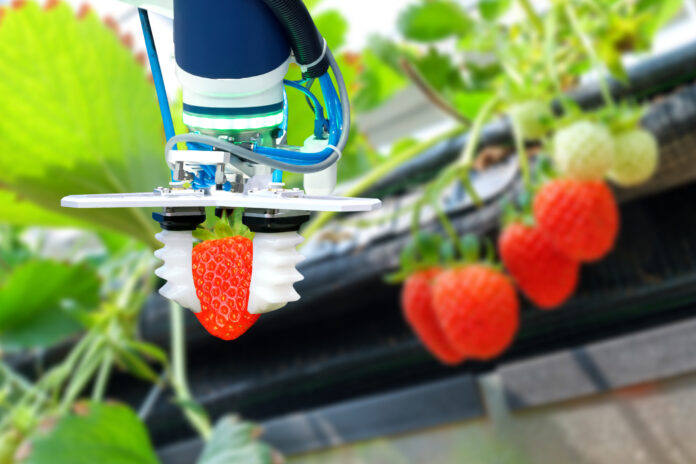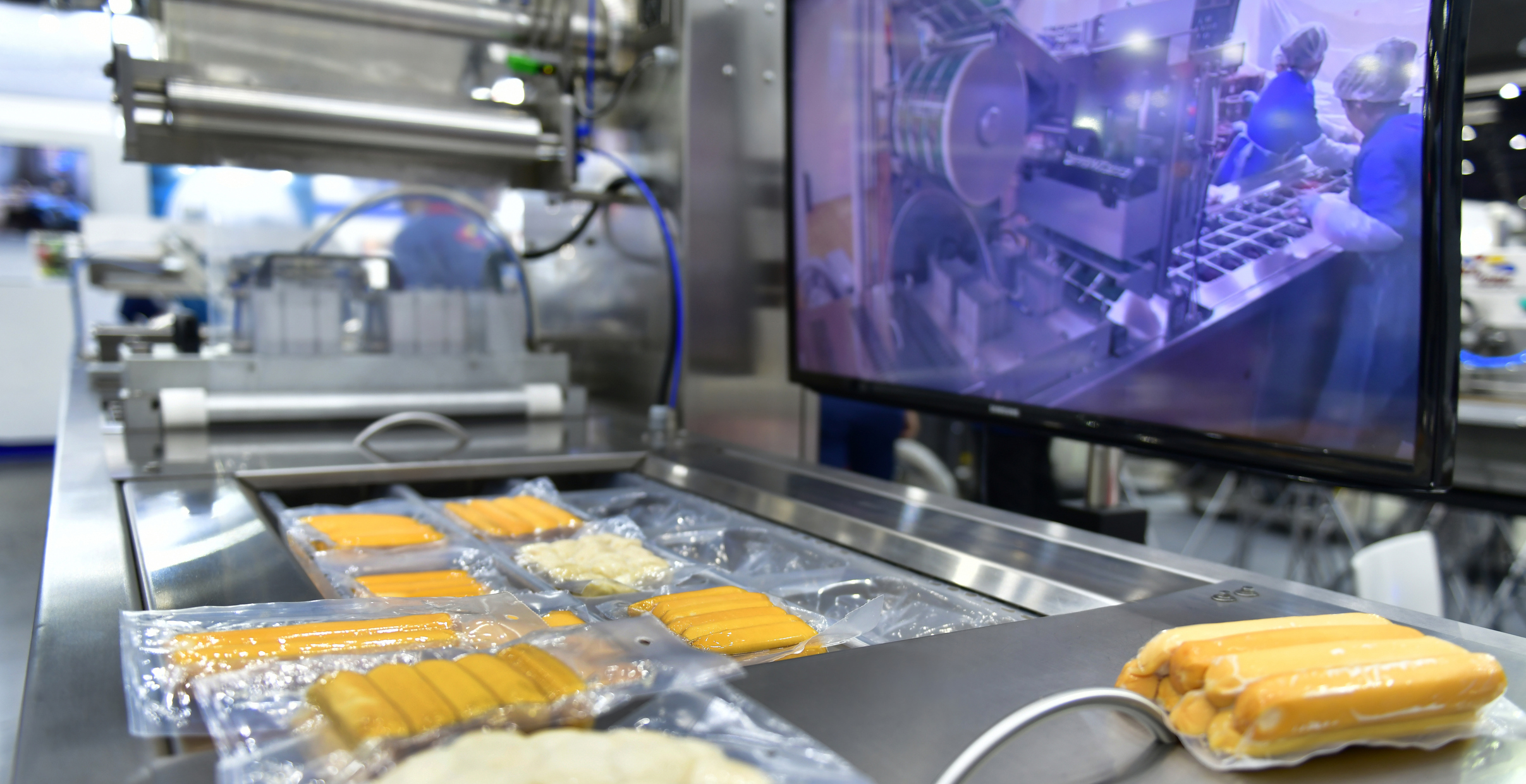
The rising demand for sustainable solutions in food manufacturing emphasizes the industry’s critical role in addressing global environmental challenges, resource inefficiencies, and quality inconsistencies. Artificial intelligence (AI) is emerging as a transformative force, offering innovative pathways to optimize production, minimize waste, and enhance sustainability.
The integration of advanced technologies, including AI-driven tools, predictive analytics, and automation, has redefined traditional processes. From optimizing intricate processing lines to bolstering food safety and addressing the food waste problem, AI is gearing up to be a game-changer as Indian startups and established players alike embrace its potential.
This possibility was the topic of discussion at a conference organized by the National Institute of Food Technology Entrepreneurship and Management (NIFTEM) to explore cutting-edge technologies in the sector. The participants, who included government officials and experts, felt the need for a plan to use AI solutions, which are still in their early stages within India’s extensive food processing domain.
The meeting was attended by Anita Praveen, secretary of food processing, Ministry of electronics and information technology (MEITY) secretary S Krishnan, and Ramesh Chand, a member of NITI Aayog. Praveen stressed the importance of creating a roadmap. S Krishnan said the widespread adoption of AI is needed, adding that while some progress has been made in agriculture, the food processing sector lags in leveraging such technologies.
Ramesh Chand emphasized the climate-friendly aspect of efficient food processing, stressing its role in augmenting farmer incomes, meeting consumer demands, and mitigating environmental challenges posed by climate change. Officials underscored the potential of AI tools to enhance overall sectoral efficiency, aligning with India’s goal of achieving net-zero emissions by 2070.
India’s overall AI market is projected to grow from US$ 8 billion in 2025 at a 40% CAGR to US$ 17 billion by 2027, says a BCG report. Across sectors, next-gen AI tools are driving efficiency, improving data accuracy, and automating complex analytical tasks to reduce rework and retesting, directly lowering operational costs. They enable faster turnaround times, enhance R&D throughput, and simplify workflows, easing staff training and helping maintain consistent performance.
Revolutionizing food processing
Though in the nascent stages, the Indian food processing industry, a cornerstone of the economy, is witnessing a significant shift towards AI-driven automation and efficiency. AI-powered robotics is increasingly being deployed for tasks such as sorting, grading, and packaging, reducing manual intervention and improving precision. This is particularly crucial in a country like India, which handles a vast diversity of agricultural produce.

AI and robotics are used in agriculture and food manufacturing, and to improve production, sustainability, and efficiency. AI-powered tools are optimizing production lines, minimizing waste, and maximizing resource utilization. Companies are leveraging AI to predict demand patterns, manage inventories with greater accuracy, and even track products from harvest to distribution, leading to a more resilient and sophisticated food ecosystem. The focus is not just on volume but also on consistent quality, with automated systems ensuring higher standards across batches.
New era of food safety — From reactive to proactive
Food safety has long been a critical concern, and AI is offering capabilities to address it. Indian food businesses are actively exploring and implementing AI solutions to ensure the integrity of their products. One of the most promising applications is predictive analytics. AI models, trained on vast datasets encompassing environmental factors, storage conditions, and even microbial behavior, can now forecast spoilage risks and identify potential contamination threats before they escalate. This shift from a reactive to a proactive approach is vital for preventing foodborne illnesses and safeguarding public health.
Furthermore, cloud-based online inspection systems are revolutionizing quality control. AI-powered cameras are inspecting production lines, quickly detecting anomalies, foreign objects, or improper labeling with far greater speed and accuracy than human inspection. Startups are even developing AI-powered pathogen detection technologies that can reduce testing times from days to mere minutes, enabling swift intervention.
The integration of AI with blockchain technology is enhancing traceability and transparency in the supply chain. This allows for real-time tracking of food products, enabling rapid identification of contamination sources and efficient product recalls, minimizing consumer exposure to unsafe food.
India’s Food Safety and Standards Authority of India (FSSAI) is actively encouraging and mentoring startups deploying AI and machine learning for a stronger regulatory system, with initiatives like ‘Raman 1.0,’ a handheld spectrometer leveraging AI for field-based spectroscopy.
Tackling Food Waste — A data-driven approach
India grapples with significant food waste, with estimates suggesting substantial losses from post-harvest to consumption. AI is proving to be a powerful ally in the fight against this challenge. Key to this is smarter demand forecasting.
AI agents analyze historical sales data, market trends, and even social signals to predict demand with great accuracy. This allows businesses, from large retailers to catering services, to optimize their stock levels, preventing overproduction and the subsequent spoilage of perishable goods. Online grocery giants such as BigBasket have reportedly reduced their food waste by nearly 25% since 2020 by implementing AI-driven inventory management systems.
Beyond forecasting, AI is being used for real-time waste monitoring. In commercial kitchens and food service operations, AI-powered systems with cameras and sensors are tracking and categorizing discarded food, providing invaluable insights into waste patterns. This data helps in adjusting menu planning, portion sizes, and preparation methods. Rassense, an Indian food service company, has pioneered IoT-enabled smart bins that track waste daily, displaying results on digital dashboards to educate consumers and inform production adjustments.
Innovation extends to smart packaging. AI-enabled apps can predict food freshness from smartphone photos, empowering consumers to make informed decisions and reduce household waste. Researchers and innovators are working on packaging solutions that use advanced sensors and AI to measure spoilage indicators in real-time, moving beyond static expiration dates. Additionally, the supposed active and intelligent packaging will be able to display food conditions with a litmus effect by changing color depending on the temperature and perishability of a product.
While challenges remain, particularly in data standardization and initial investment costs, the transformative potential of AI in India’s food sector is undeniable. As the nation continues to embrace digital innovation, AI is set to play an increasingly vital role in ensuring a more efficient, safer, and sustainable food system for its vast population.
IndiFoodBev — authentic, impactful and influential
An English-language food and beverage processing and packaging industry B2B platform in print and web, IndiFoodBev is in its third year of publication. It is said that the Indian food and beverage industries represent approximately US$ 900 billion in revenues which implies more than 20% of the country’s GDP. Eliminating the wastage on the farmside can help to deliver more protein to a higher number of the population apart from generating sizable exports. The savings in soil, seeds, water, fertilizer, energy and ultimately food and nutrition could be the most immense contribution that country is poised to make to the moderation of climate change.
To improve your marketing and grow sales to the food and beverage processing and packaging industry, talk to us. Our research and consulting company IppStar [www.ippstar.org] can assess your potential and addressable markets in light of the competition. We can discuss marketing, communication, and sales strategies for market entry and growth.
Suppliers and service providers with a strategy and budget for targeted marketing can discuss using our hybrid print, web, video, and social media channels to create brand recognition linked to market relevance. Our technical writers are ready to meet you and your customers for content.
The second largest producer of fruit and vegetables in the world is continuously expanding processing capacities and delivery systems with appropriate innovative technologies. We cover product and consumer trends, nutrition, processing, research, equipment and packaging from farm to thali. Get our 2025 media kit and recalibrate your role in this dynamic market. Enhance your visibility and relevance to existing markets and turn potential customers into conversations. Ask for a sample copy of our bi-monthly in print or our weekly IndiFoodBev eZine each Wednesday.
For editorial info@ippgroup.in — for advertisement ads1@ippgroup.in and for subscriptions subscription@ippgroup.in
Naresh Khanna – 10 February 2025
Subscribe Now










